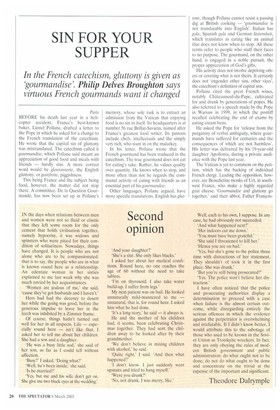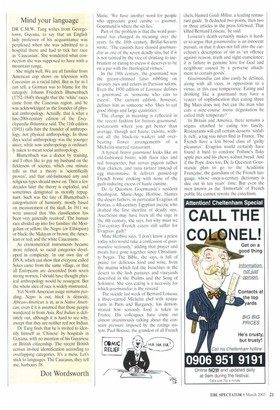SIN FOR YOUR SUPPER
In the French catechism, gluttony is given as
'gourmandise'. Philip Delves Broughton says
virtuous French gourmands want it changed
Paris BEFORE his death last year in a helicopter accident, France's best-known baker, Lionel Poilane, drafted a letter to the Pope in which he asked for a change to the French translation of the catechism. He wrote that the capital sin of gluttony was mistranslated. The catechism called it gourmand/se. which Poilane said meant an appreciation of good food and meals with friends — hardly sins. A more correct word would be gloutonnerie, the English gluttony, or goinfrerie, piggishness.
This being France and the subject being food, however, the matter did not stop there. A committee, De la Question Gourmande, has now been set up in Poilane's memory, whose sole task is to extract an admission from the Vatican that enjoying food is no sin in itself. Its headquarters is at number 56 rue Brillat-Savarin, named after France's greatest food writer. Its patrons include chefs, intellectuals and the simply very rich, who want in on the malarkey.
In his letter. Poilane wrote that the French gourmand has been traduced in the catechism, The true gourmand does not eat for eating's sake. Rather, he values quality over quantity. He knows when to stop, and more often than not he regards the communal activity of eating with friends as an essential part of his gourmandise.
Other languages, Poilane argued, have more specific translations. English has glut
tony, though Poilane cannot resist a passing dig at British cooking — 'gourmandise is not translatable into English'. Italian has go/a, Spanish gula and German histernheit, which translates as eating like an animal that does not know when to stop. All these terms refer to people who stuff their faces to no purpose. The gourmand, on the other hand, is engaged in a noble pursuit, the proper appreciation of God's gifts.
His activity does not involve depriving others or coveting what is not theirs. It certainly does not 'engender other sins, other vices', the catechism's definition of capital sins.
Poilane cited the great French wines, notably Chateauneuf-du-Pape, cultivated for and drunk by generations of popes. He also referred to a speech made by the Pope in Warsaw in 1999, in which the pontiff recalled celebrating the end of exams by eating cream buns.
He asked the Pope for 'release from the purgatory of verbal ambiguity, where gourmands have suffered for centuries and the consequences of which are not harmless'. His letter was delivered by his 19-year-old daughter Apollonia, during a private audience with the Pope last year.
The Vatican is yet to comment on the petition, which has the backing of individual French clergy. Leading the opposition, however. are Benedictine monks of Urt, in southwest France, who make a highly regarded goat cheese. 'Gourmand/se and gluttony go together,' said their abbot, Father Francois Marie. 'We have another word for people who appreciate good cuisine — goutmet. Gourmand is where the sin lies.'
Part of the problem is that the word gourmand has changed its meaning over the years. In the 18th century, Brillat-Savarin wrote, 'The casuists have classed gourmandise as one of the seven deadly sins, but if it is not tainted by the vice of drinking to inebriation or eating to excess it deserves to be on a par with the theological virtues.'
In the 19th century, the gourmand was the greasy-chinned fatso nibbling on savoury pies and eclairs in Parisian salons. Even the 1930 edition of Larousse defines a gourmand as 'someone who eats to excess'. The current edition. however, defines him as someone who 'likes to eat good things and large quantities'.
The change in meaning is reflected in the recent fashion for bistrots gourmand, restaurants where you get better than average, though not haute, cuisine, without all the black-tie waiters and overbearing flower arrangements of a Michelin-starred restaurant.
A typical bistrot gourmand looks like an old-fashioned bistro, with floor tiles and red banquettes, hut serves pigeon rather than chicken, and tuna tartarc instead of egg mayonnaise. It delivers gussied-up French home cooking with none of the guilt-inducing excess of haute cuisine.
De la Question Gourmande's resident theologian, Marie-Ange Herbise, blames the desert fathers, in particular Evagrius of Pontus, a 4th-century Egyptian ascetic who drafted the first shortlist of deadly sins. Asceticism may have been all the rage in the 4th century, she says, but why must we 21st-century French eaters still suffer for Evagrius guilt?
Mme Herbise says, 'I don't know a priest today who would take a confession of gourmandise seriously,' adding that prayer and meals have gone together since Christianity began. The Bible, she says, is full of praise for delicious food and wine, from the manna which fed the Israelites in the desert to the lush pastures and vineyards described in the Psalms and the Song of Solomon. She says eating is a necessity for which gourmandise is the reward.
The suicide last week of Bernard Loiseau, a three-starred Michelin chef with restaurants in Paris and Burgundy, has demonstrated how seriously food is taken in France. His colleagues have come out almost unanimously talking about the constant pressure imposed by the ratings system. Paul Bocuse, the grandest of all French chefs, blamed Gault Millau, a leading restaurant guide. 'It deducted two points, then two or three articles in the press followed. That killed Bernard Loiseau,' he said.
Loiseau's death certainly makes it harder to argue that gourmandise is an innocent pursuit, or that it does not fall into the catechism's description of sin as 'an offence against reason, truth and right conscience; it is failure in genuine love for God and neighbour caused by a perverse attachment to certain goods'.
Gourmandise can also easily be defined, along with all vices, in opposition to a virtue, in this case temperance. Eating and drinking like a gourmand may have a veneer of sophistication that eating three Big Macs does not, but can the man who eats a nine-course menu &gustation be called truly temperate?
In Britain and America, there remains a stigma attached to eating too fancily. Restaurants will call certain desserts `sinfully rich', a tag you never find in France. The French have a less broad class of 'guilty pleasures'. Evagrius would certainly have found it hard to condone Poilane's flaky apple pies and his chewy walnut bread. And if the Pope does too, De la Question Gourmamle plan to go to the Academic Francaise, the guardians of the French language, whose once-a-century dictionary is due out in ten years' time. But even the men known as the 'Immortals' of French public life cannot rewrite the catechism.



































































 Previous page
Previous page